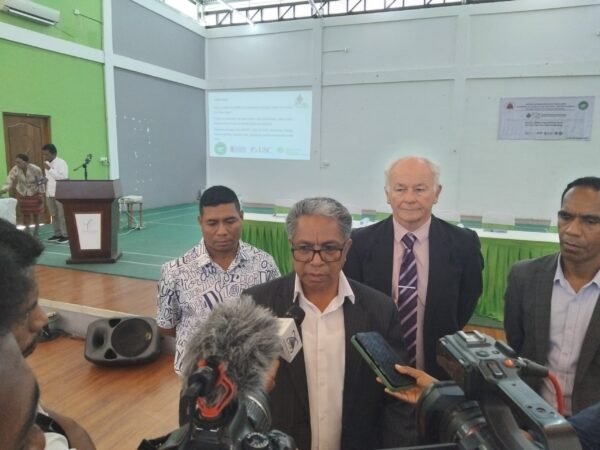Dili, August 7, 2025 (Média Democracia) – The Ministry of Agriculture, Livestock, Fisheries, and Forestry (MAPPF) has confirmed that the rabies outbreak has already claimed the lives of six people this year. The statement was made during a press briefing held on Tuesday.
In an interview, Minister Marcos Mameta da Cruz explained that in 2025 alone, six people have died from rabies. As a result, MAPPF, in collaboration with the Ministry of Health, continues to strengthen efforts to prevent the spread of rabies in communities.
“Last year, the Ministry of Agriculture, Livestock, Fisheries, and Forestry carried out a vaccination campaign for animals such as dogs, cats, and monkeys,” said Minister Marcos Mameta da Cruz.
He added that the ministry received support from the Australian Government, providing around 200 doses of rabies vaccines. This year, teams were deployed to vaccinate animals in the municipalities of Bobonaro, Covalima, Dili, and the Special Administrative Region of Oecusse-Ambeno (RAEOA).
“Our team from the National Directorate of Veterinary Services also detected rabies cases in Aileu and Ermera municipalities, which prompted veterinary health teams to continue animal vaccination efforts,” the Minister told journalists at Timor Lodge on 5 August.
He urged all community members who keep dogs, cats, or monkeys to bring their animals to the National Directorate of Veterinary Services so they can be vaccinated.
“We have a clinic at the Ministry of Agriculture where communities can bring their animals for vaccination, and our teams also go directly to the communities to ensure vaccination efforts reach everyone in order to prevent rabies,” he added.
The Minister emphasized that MAPPF is working closely with the Ministry of Health to develop a National Strategic Plan to tackle the rabies issue in the country.
“Veterinary health teams are continuing vaccination activities in each municipality and we ask communities with dogs to cooperate with the veterinary teams for rabies prevention,” he stressed.
He appealed to the public to be honest and willing to present their dogs for vaccination when health teams visit their homes. He expressed concern that sometimes people hide their dogs, and only bring them out after the health teams have left.
“Sometimes they wait until the teams leave and then release the dogs into the fields. This is why we continue awareness campaigns urging people to present their dogs during scheduled vaccination days,” he said.
The Minister underlined that rabies is a very dangerous disease; once bitten by an infected dog, a person may appear fine but can die days later if not treated. Anyone bitten must seek immediate treatment at a clinic.
Previously, the Director General of Livestock and Veterinary Services, Carlos Amaral, reported that 60 dogs tested positive for rabies.
“Our team detected 60 dogs that tested positive after testing their brain samples in the lab once they had died. These infected dogs posed a risk to humans,” he told journalists in Comoro last Friday.
He pointed out that the areas most affected by rabies are the border municipalities of Covalima and Bobonaro, as well as RAEOA.
“In Dili and Atauro, the risk is low, but since the disease is prevalent in border areas where movement is high and not restricted, our teams have been stationed there to carry out vaccinations. Of the 60 dogs that tested positive, all came from Covalima, Bobonaro, and RAEOA, where rabid dogs had bitten humans,” he emphasized.
The Director said that the vaccination effort initially targeted animals in the border areas, which are considered high-risk zones for rabies due to high circulation and weak movement controls. He explained that rabies prevention treatments are not easy to administer quickly, especially if the bite is not reported immediately.
“There was a case in Maliana where a person was bitten by a dog, but didn’t die. Later, two more dogs were detected positive. Every rabies case must follow proper procedures, and we are responsible for reporting them,” he emphasized.
In 2023, rabies was first detected in February and continued until December, with one child dying in RAEOA, marking the first known case of rabies in Timor-Leste. At that time, the government received 200,000 doses of vaccines to carry out mass animal vaccinations.
He further explained that in February 2024, the Australian government supported Timor-Leste with 50,000 more doses of vaccines, covering both animal vaccinations and treatment support.
Report: Domingas
Photo: Domingas

